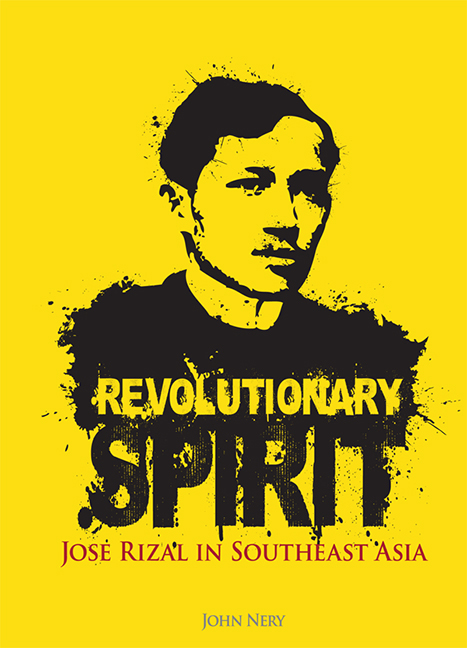Book contents
- Frontmatter
- Dedication
- Epigraph
- Contents
- Foreword
- Message
- Preface
- Acknowledgements
- INTRODUCTION The Uses of Error A Rizal Chronology
- 1 TURNING POINTS
- 2 “THE VERY SOUL OF THIS REBELLION”
- 3 DOCTOR RIZAL
- 4 “HALFBLOED”
- 5 “NO MARX OR LENIN”
- 6 UNDER THE SOUTHERN SUN
- 7 THE HOPE OF MILLIONS IN ASIA
- 8 “HIS NAME IS SWEET IN OUR MEMORY”
- 9 THE MYTH BUSTERS
- 10 “A GREAT HISTORICAL EXPERIMENT”
- Epilogue
- Appendices
- A A Man of Letters
- B Falling for the American Trap
- C “Colour and Scent, Light and Sound”
- References
- Index
B - Falling for the American Trap
from Appendices
Published online by Cambridge University Press: 21 October 2015
- Frontmatter
- Dedication
- Epigraph
- Contents
- Foreword
- Message
- Preface
- Acknowledgements
- INTRODUCTION The Uses of Error A Rizal Chronology
- 1 TURNING POINTS
- 2 “THE VERY SOUL OF THIS REBELLION”
- 3 DOCTOR RIZAL
- 4 “HALFBLOED”
- 5 “NO MARX OR LENIN”
- 6 UNDER THE SOUTHERN SUN
- 7 THE HOPE OF MILLIONS IN ASIA
- 8 “HIS NAME IS SWEET IN OUR MEMORY”
- 9 THE MYTH BUSTERS
- 10 “A GREAT HISTORICAL EXPERIMENT”
- Epilogue
- Appendices
- A A Man of Letters
- B Falling for the American Trap
- C “Colour and Scent, Light and Sound”
- References
- Index
Summary
Falling for the American Trap
Renato Constantino's “Veneration without Understanding” was the astounding Rizal Day Lecture of 1969. The courageous, cobwebclearing exercise in provocation has since become the classic critique of Rizal and his pre-eminence in the Philippine pantheon of heroes.
What, exactly, did Constantino say? He said that Filipinos who hold Rizal up as the ideal hero do not understand that he was, in truth, a counter-revolutionary — and therefore insufficiently nationalistic. “Rizal repudiated the one act which really synthesized our nationalist aspiration, and yet we consider him a nationalist leader.” That “one act” was the revolution of 1896.
“Veneration,” however, is replete with false choices. Constantino's critique is based, not only on a Marxist reading of history and nationalism (for instance: “The exposure of his weaknesses and limitations will also mean our liberation, for he has, to a certain extent become part of the superstructure that supports present consciousness”) but also, and tellingly, on a rhetoric of false dichotomies.
A Marxist reading of Rizal is not necessarily impossible; E. San Juan Jr. has written incisively on Rizal's writings from just such a perspective. For instance, in his post-2001 riposte to Constantino entitled “Understanding Rizal without Veneration,” San Juan wrote: “As I have tried to argue in previous essays, Rizal displayed an astute dialectical materialist sensibility. One revealing example of concrete geopolitical analysis is the short piece on Madrid and its milieu excerpted in Palma's ‘The Pride of the Malay Race’ (pp. 60–62).” (Rizal's notes, originally written in French, in Heidelberg, show not only a sense of place but also some feel for demographic description and analysis.)
But an argument anchored on false choices is not only deceiving; it fosters a new misunderstanding. In 1969 (and again in 1979, when he published the lecture as one chapter in Dissent and Counter-Consciousness), Constantino may have been moved by a genuine desire to offer a corrective to the prevailing hero worship of Rizal. But a corrective based on false logic can work only if it itself is based on false consciousness; in other words, if a reader or an auditor did not know any better.
Right at the start, “Veneration” offers a false choice between revolutionary leader and national hero. “In the histories of many nations, the national revolution represents a peak of achievement,” Constantino writes.
- Type
- Chapter
- Information
- Revolutionary SpiritJose Rizal in Southeast Asia, pp. 243 - 248Publisher: ISEAS–Yusof Ishak InstitutePrint publication year: 2011

